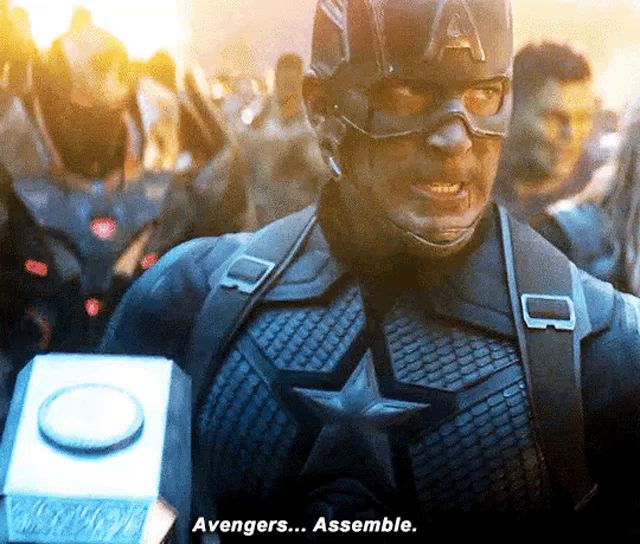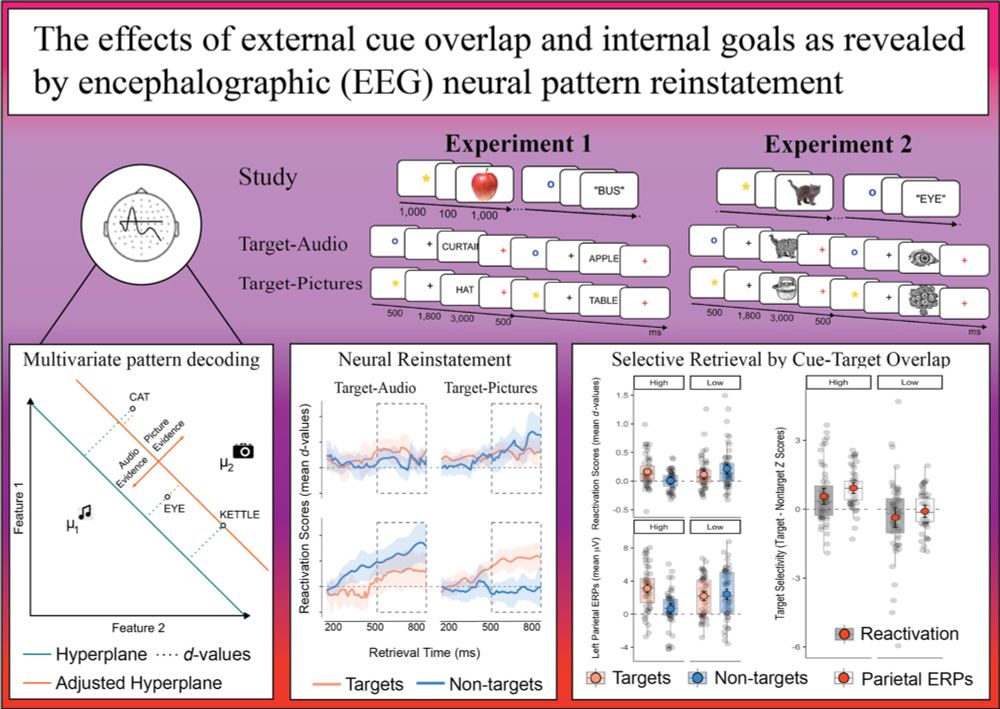The podcast is now available on Spotify!
You can still take part in our survey here: cambridge.eu.qualtrics.com/jfe/form/SV_...
31.10.2025 16:03 — 👍 2 🔁 3 💬 0 📌 0
This was super fun! Thanks @alexandrapike.bsky.social for proposing and to @chloebrunskill.bsky.social and all speakers and attendees for making this day happen! 🥹
29.10.2025 18:59 — 👍 5 🔁 1 💬 0 📌 0
🥳
24.10.2025 13:13 — 👍 0 🔁 0 💬 0 📌 0
It is a great pleasure to share this new collaborative work on the Cognitive Neuroscience of Memory Representations with @fnim-lab.bsky.social @cvlneuro.bsky.social @psychologyuea.bsky.social
osf.io/preprints/ps...
01.05.2025 16:12 — 👍 16 🔁 12 💬 3 📌 1

On the left: an illustration from Brooke's 1904 rendition of Goldilocks and the Three Bears, where Little bear discovers their favourite chair is broken 😲. On the right, a sketch of what a corresponding "situation model" might contain.
How might stories shed light on brain function? Check out this opinion piece by @alexbarnett.bsky.social and I about the DMN and "situation models" -- our understanding of the current "state of affairs" in a story (or even experience).
www.sciencedirect.com/science/arti...
05.09.2025 13:33 — 👍 52 🔁 20 💬 3 📌 0
Was meant to be presenting at #BACN25 on Thursday. Unfortunately, COVID has decided otherwise. My poster will still make an appearance though. Even better? It’s presented by @aidanhorner.bsky.social instead! Go check it out on Thursday along with other lab posters on narratives, objects and schema.
08.09.2025 16:28 — 👍 6 🔁 3 💬 1 📌 0

Hi! Nice to virtually meet you! Here is the QR code to a PDF of the poster. Glad you found it interesting! If you have any questions or want more details, happy to chat about it! 🙂
08.09.2025 14:26 — 👍 3 🔁 1 💬 2 📌 0

captain america is holding a hammer and says avengers assemble
Alt: Captain America holding Mjölnir and says: “Avengers… Assemble!”
Mixed-effects modellers, assemble!
Just dropped a (very niche) blog on the weird quirks that occur with uncorrelated random effects and the trifecta of packages: lme4, afex, and performance (in R).
Read here 👉 sites.google.com/view/jamieco...
#rstats #MixedModels #lme4 #afex #performanceR
02.08.2025 14:12 — 👍 23 🔁 7 💬 2 📌 0
So happy this is finally out! Despite Covid delays and thanks to persistence by @arimoccia.bsky.social + the helpful reviewers
Starting to uncover how memory cues and goals interact - with implications for how we understand memory reconstruction during retrieval
23.07.2025 10:12 — 👍 10 🔁 3 💬 1 📌 0
Thank you Giuli!! 🙏
29.07.2025 17:54 — 👍 0 🔁 0 💬 0 📌 0
Jobs - The University of York
📣 New job alert! I'm looking for a 2-year research assistant for a project on word learning from childhood to adulthood. Come and join us in lovely York! Please RT 🙏 @yorkpsychology.bsky.social jobs.york.ac.uk/vacancy/rese...
17.07.2025 12:44 — 👍 32 🔁 42 💬 1 📌 1
Thanks Marius!! 🙏 Hope you’ll enjoy reading it!
16.07.2025 18:48 — 👍 1 🔁 0 💬 0 📌 0
Thanks for reading till the end. Questions and comments are welcome!
Thanks to #FundaçãoBial for funding and to @jamiecockcroft.bsky.social for stats advice!🧵9/9
16.07.2025 11:15 — 👍 3 🔁 0 💬 1 📌 0

Results suggest at least two stages of selection within the retrieval cascade: 1) external cues modify which memories get reinstated & 2) further goal-driven processing amplifies targeted memories in line with goals. For simple model inspired by doi.org/10.1016/j.ti... 🧵8/9
16.07.2025 11:15 — 👍 1 🔁 0 💬 1 📌 0

Final result: people also reinstated neural patterns as they prepared to retrieve the upcoming trial (at least when cues were words). As predicted by the encoding specificity principle this preparatory goal-related reinstatement may be how selective retrieval is achieved🧵7/9
16.07.2025 11:15 — 👍 1 🔁 0 💬 1 📌 0

This differed with our original findings for the left parietal ERP. This ERP (Bottom Left) was more target-selective than reinstatement (Top Left) when cues matched targets more, but when cues matched non-targets more, only reinstatement was selective for non-targets (Right for comparison)🧵6/9
16.07.2025 11:15 — 👍 1 🔁 0 💬 1 📌 0

Decoding of scalp ERPs showed: reinstatement of study phase neural patterns was target-selective when the external cues matched targets = audio with word cues (Exp1) or pictures with picture cues (Exp2), but was reversed (non-target > target) when cue match was greater with non-targets🧵5/9
16.07.2025 11:15 — 👍 1 🔁 0 💬 1 📌 0
But the left parietal ERP may reflect the outcome of high-level cortical processing during recollection. As goal-driven reconstruction can transform initial pattern-completed neural representations, we reasoned that goals and cues might impact recollection at multiple stages🧵4/9
16.07.2025 11:15 — 👍 1 🔁 0 💬 1 📌 0

In earlier study, people had to retrieve target objects studied as audios or pictures (in #CABN see doi.org/10.3758/s134...). Retrieval success ERPs (left parietal effect) were target-selective (> non-targets) – but only when external cues matched the targeted information🧵3/9
16.07.2025 11:15 — 👍 1 🔁 0 💬 1 📌 0
When remembering, people reactivate neural patterns of original events. This neural reinstatement is initiated when the hippocampus pattern-completes studied events from retrieval cues. Given a cue, would goals modify reinstatement so it's selective for targeted memories?🧵2/9
16.07.2025 11:15 — 👍 1 🔁 0 💬 1 📌 0
How are relevant memories selected out of a large store of events? We measured🧠#EEG neural reinstatement to test how selective memory retrieval is achieved 🧵1/9
16.07.2025 11:15 — 👍 1 🔁 0 💬 1 📌 0
Paper accepted!!!
The holistic forgetting of events and the (sometimes) fragmented forgetting of objects
osf.io/preprints/ps...
#neuroskyence #psychscisky #cognition
21.11.2024 10:26 — 👍 88 🔁 15 💬 6 📌 1
Thanks for reading till the end. Questions and comments are welcome!
Thanks to Fundação Bial for funding and to @jamiecockcroft.bsky.social for stats advice!🧵9/9
15.10.2024 14:19 — 👍 1 🔁 0 💬 0 📌 0

Results suggest at least two stages of selection within the retrieval cascade: 1) external cues modify which memories get reinstated & 2) further goal-driven processing amplifies targeted memories in line with goals. For simple model inspired by Staresina & Wimber (2019; TiCS) review🧵8/9
15.10.2024 14:18 — 👍 0 🔁 0 💬 0 📌 0

Final result: people also reinstated neural patterns as they prepared to retrieve the upcoming trial (at least when cues were words). As predicted by the encoding specificity principle this preparatory goal-related reinstatement may be how selective retrieval is achieved🧵7/9
15.10.2024 14:14 — 👍 0 🔁 0 💬 0 📌 0

This differed with our original findings for the left parietal ERP. This ERP (Right) was more target-selective than reinstatement (Left) when cues matched targets more, but when cues matched non-targets more, only reinstatement was selective for non-targets🧵6/9
15.10.2024 14:13 — 👍 0 🔁 0 💬 0 📌 0

Decoding of scalp ERPs showed: reinstatement of study phase neural patterns was target-selective when the external cues matched targets (= audio with word cues or pictures with picture cues), but was reversed (non-target > target) when cue match was greater with non-targets🧵5/9
15.10.2024 14:13 — 👍 0 🔁 0 💬 0 📌 0
But the left parietal ERP may reflect the outcome of high-level cortical processing during recollection. As goal-driven reconstruction can transform initial pattern-completed neural representations, we reasoned that goals and cues might impact recollection at multiple stages🧵4/9
15.10.2024 14:12 — 👍 0 🔁 0 💬 0 📌 0
Lecturer in Psychology at the University of Leeds, UK.
Interested in autobiographical memory, ageing, amnesia, wearable tech, & ways of improving retrieval
PhD researcher at the University of York🎓. Interested in the relationship between intolerance of uncertainty, catastrophising and eating disorders.
assoc prof, uc irvine cogsci & LPS: perception+metacognition+subjective experience, fMRI+models+AI
phil sci, education for all
2026: UCI-->UCL!
prez+co-founder, neuromatch.io
fellow, CIFAR brain mind consciousness
meganakpeters.org
she/her💖💜💙views mine
MSc Mind and Brain @ Humboldt Univerty
BA Psych & BS MolBioGen @ Koç University
aspiring memory researcher | she/her
Cognitive Neuroscience Society (33rd) Annual Meeting will be held March 7 -10, 2026 in Vancouver, B.C., Canada. #CNS2026
https://www.cogneurosociety.org/
Postdoctoral researcher in cognitive neuroscience at LMU, Munich
Professor of Cognitive Neuroscience
University of Oxford
https://www.staresinalab.com/
🧠 medical neurosciences @Charité
interested in memory, sleep, neuron-glia interaction, health, and scicomm 🌈
PhD student cog. neuroscience | Passionate about episodic memory and its relation to actions 🎬👤 👀 💾 | EEG, iEEG, wading through multimodal data like head motion and eye tracking 🪷🏞️ 🧠| Graduate School of Systemic Neurosciences | LMU Munich | StaudiglLab
CNS is committed to the development of mind and brain research aimed at investigating the psychological, computational, and neuroscientific bases of cognition. #CNS2026 in Vancouver, March 7-10!
she/her
Cognitive Neuroscience PhD candidate 🧠
Univ of Granada/CIMCYC https://cimcyc.ugr.es/en
Neuroscientist at University of Glasgow
Enthusiastic about all things entorhinal cortex
Avid reader, (occasional) runner, always on a side quest
she/her, views are my own
Postdoc Max Planck Institute for Human Cognitive and Brain Sciences.
Cognitive Neuroscientist | #Memory & #Sleep | from single neurons to sleep oscillations in humans | http://schreiner-lab.com, Trinka-Lab and with Mormann-Lab.
Postdoc at Columbia University. Researching the neural mechanisms behind memory formation using electrophysiology.
(She/Her)
PhD student in Cognitive Neuropsychology @ LMU Munich
PhD student of cognitive psychology @Cambridge Uni MRC CBU
ODTU Psy 2020'
Sabancı Psy MS 2022'
Film and basketball enthusiast
Insufferable film reviews at letterboxd: fserin
Cognitive psych interested in distributed cognition, memory, weird and non-weird beliefs, cognitive biases, conspiracy belief, misinformation, scientific vs lay cognition, climate change, open science, metascience, 4eCognition.
From Aotearoa/New Zealand
Postdoc at Penn interested in memory, cognitive control, and most things in between.
Computational neuroscientist interested in cognition, computation, memory, decision making. Studying the human brain.












